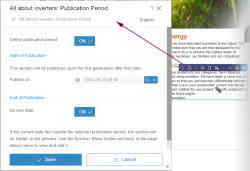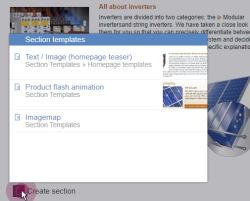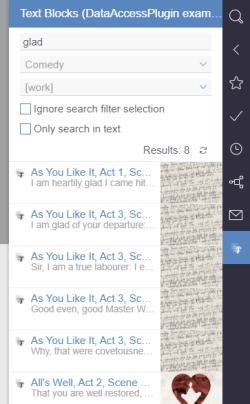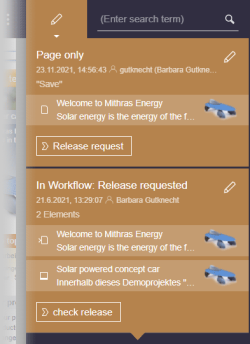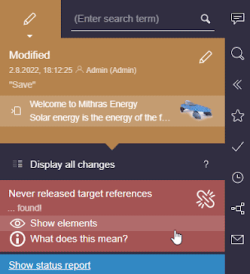Interactive Features
Client interface plug-ins enhance usability by providing project-specific, interactive features. Each of these plug-in types ties into a different area in the ContentCreator user interface and is able to handle FirstSpirit data as well as poll input from users.
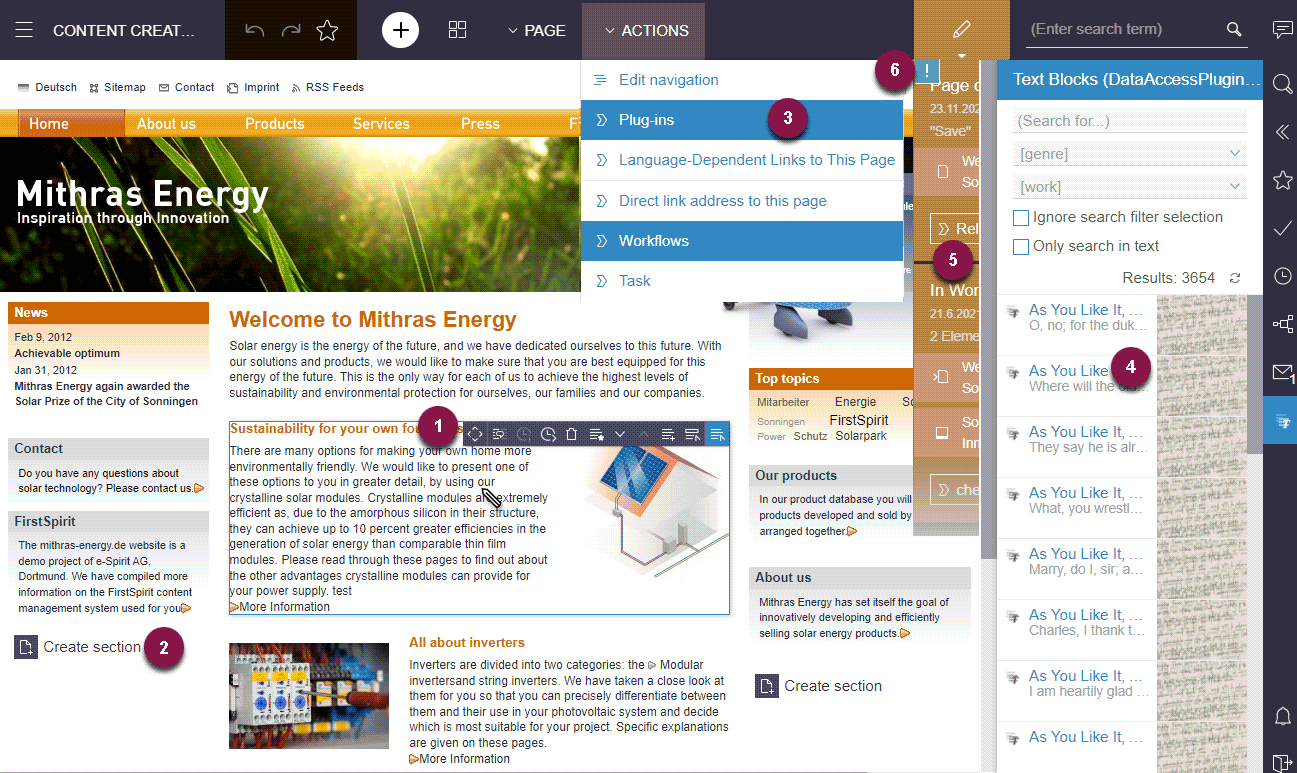
1. InlineEdit Items Plug-In
InlineEdit item plug-ins insert one or more actions into the button overlay that appears as the mouse pointer hovers over a section, page contents or data records rendered in the preview pane. The button actions work within the context of the FirstSpirit element they are associated with (e.g. a section for which an InlineEdit frame is displayed).
Access API documentation: WebeditInlineEditItemsPlugin
InlineEdit items provided by this plug-in type may implement the following functionality:
- Executable
implements a clickable button. On click, the class' executable method is called.
Access API documentation: ExecutableInlineEditItem - Client Script Provider
implements a clickable button. On click, a class method is called upon to provide JavaScript code which will be executed in the client interface.
Access API documentation: ClientScriptProvidingInlineEditItem
2. Template Buttons (FS_BUTTON)
Using the input component FS_BUTTON, template designers and project developers can provide access to scripts and Java classes that implement extra functionality. These buttons are placed directly in page, section or dataset templates, may handle click and drag-and-drop interactions, and can be rendered in forms, preview/generated representations of elements or both.
FS_BUTTON instances
- work within the context of the object associated with the template in which the button was defined
- are able to call scripts and Java classes that perform custom functionality and may create dialogs, message boxes and lists
- are able to react to both click and drag-and-drop operations
3. Toolbar Menu Items Plug-In
Toolbar menu items plug-ins may specify one or more menu items which will be shown in the Actions menu of the ContentCreator toolbar. Individual items operate within the context of the FirstSpirit element currently shown in the preview pane of the client interface.
Access API documentation: WebeditToolbarActionsItemsPlugin
A toolbar menu items plug-in can provide one or more items of the following types:
- Executable
implements a clickable menu item. On click, the class' executable method is called.
Access API documentation: ExecutableToolbarActionsItem - Client Script Provider
implements a clickable menu item. On click, a class method is called upon to provide JavaScript code which will be executed in the client interface.
Access API documentation: ClientScriptProvidingToolbarActionsItem
4. Reports (Data Access)
Custom reports are based upon FirstSpirit's data access plugin infrastructure. They may display specific sets of objects - including FirstSpirit store elements and objects obtained from other data sources such as web services - and provide filtering, sorting and data management capabilities. Individual report objects can be used as data items for drag-and-drop operations in conjunction with FS_INDEX input components in element forms and with FS_BUTTONs placed in page previews.
Access API documentation: DataAccessPlugin
Various components of the data access plugin infrastructure support aspects, some of which allow configuration and display of reports shown in ContentCreator and SiteArchitect as well as user interactions with these reports.
Reports
- are able to include and work with FirstSpirit objects as well as content from outside sources
- are able to serve as a source for drag-and-drop data (based on objects listed in the report)
5. Element Status and Workflow Grouping Plug-Ins
This plug-in type specifies a project-wide algorithm to determine the page status (whether it is considered released, modified or currently in a workflow) that is displayed in the ContentCreator toolbar. It may also provide groups of pages, page references and media elements that users may place into workflows together as a batch operation.
Access API documentation: WebeditElementStatusProviderPlugin
Element status display and workflow grouping plug-ins
- operate within the context of the page reference that is currently displayed in the preview pane
- optionally assemble groups of objects related to the current preview--using the page reference object as a point of origin--that ContentCreator will use to identify available workflows
 |
Note that page status and workflow grouping plug-ins should implement read-only functionality; they are not intended to modify store content or create interactive features. |
6. Page-Based Notifications
These notifications are collected each time a navigation event occurs in the ContentCreator preview. They will be shown within the page status flyout of the ContentCreator toolbar as well as - optionally - prominently underneath the page status display.
Translation Help
ContentCreator's translation help feature may be started using a TranslationOperation. In the standard case, the translation help dialog supports manual side-by-side translation processes.
The operation may optionally be configured with an implementation of the interface TranslationPlugin in order to perform translations using external translation services on an automatic or on-demand basis.
Access API documentation:
TranslationOperation
TranslationPlugin


